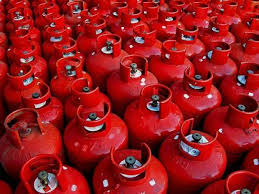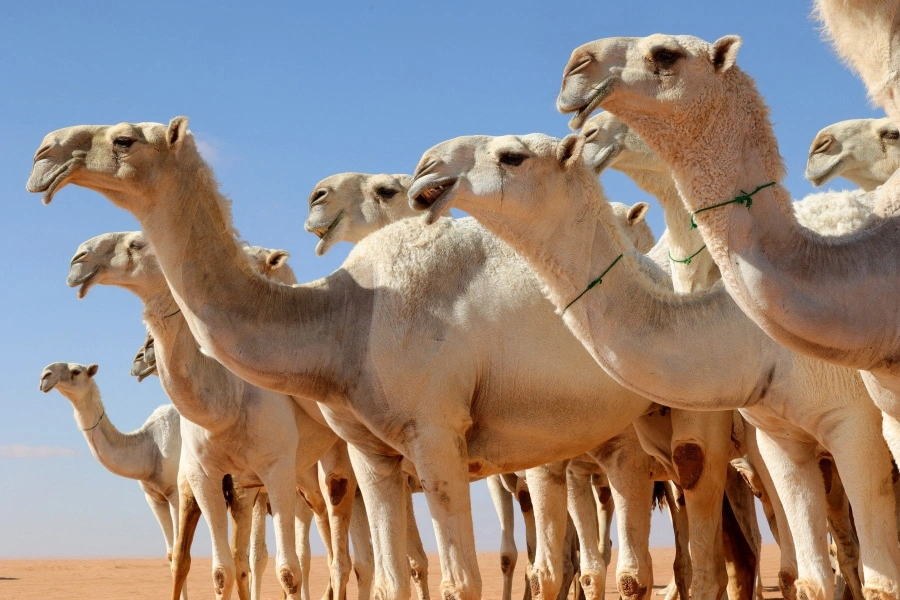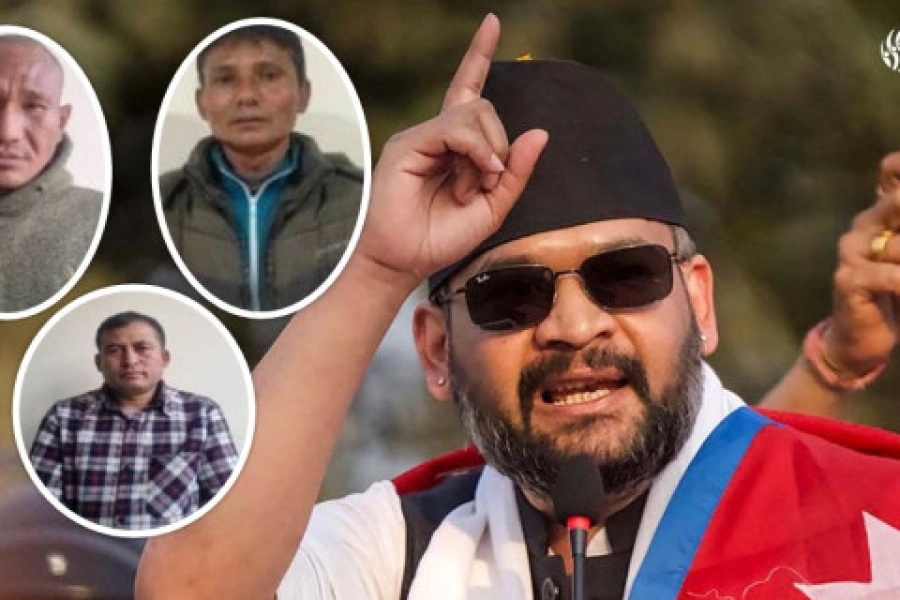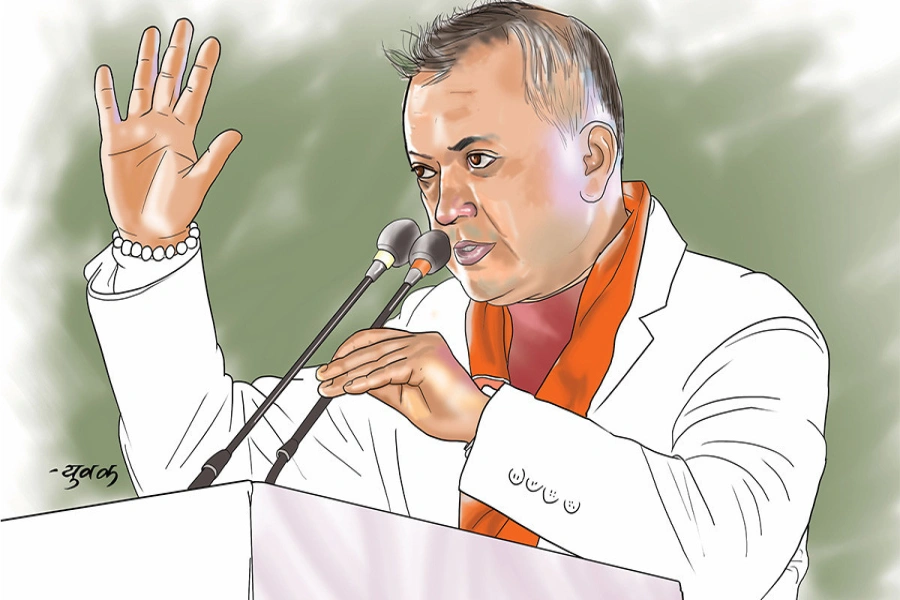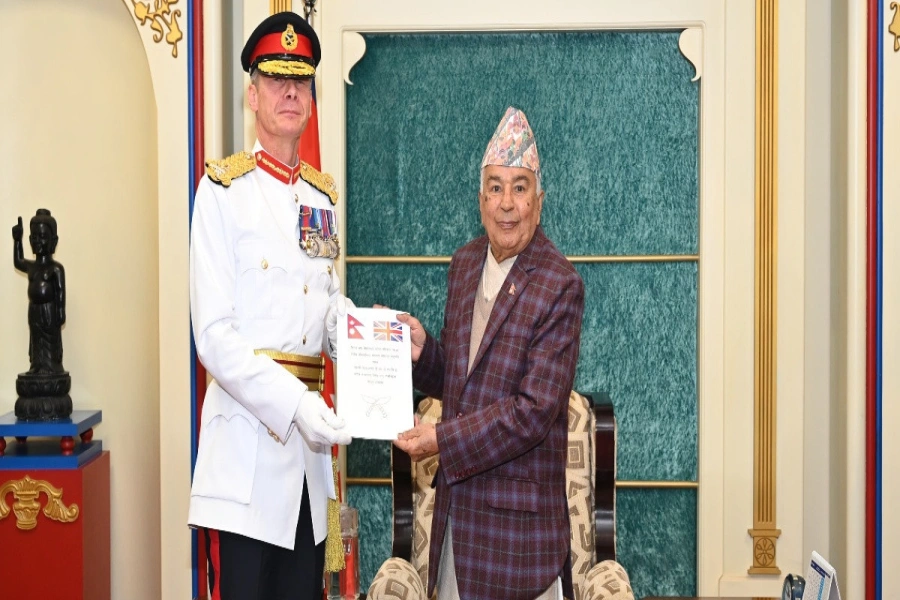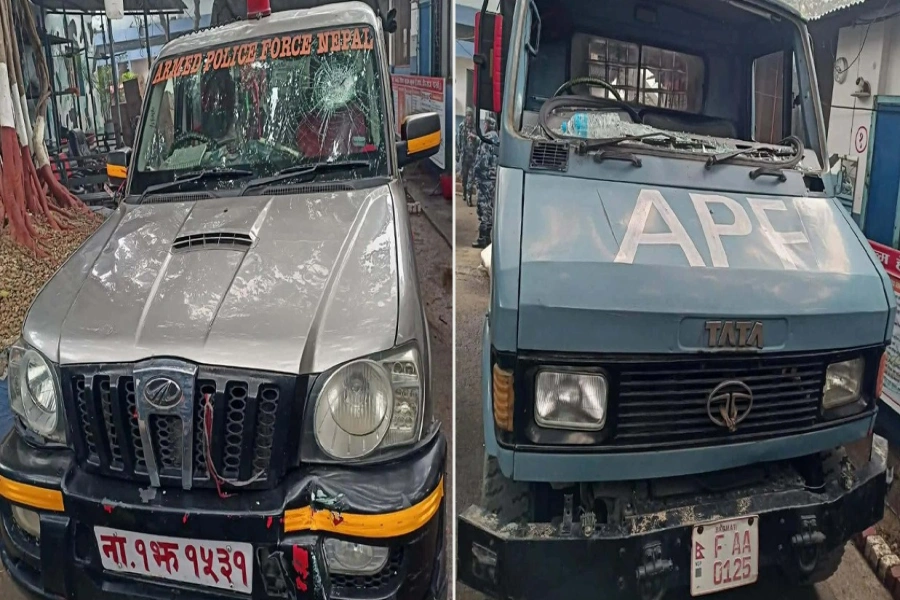The great Xi Jinping, often lovingly referred to as Xi Dada (uncle) in China, just completed his two-day state visit to Nepal. Nepali politicians of course love their Xi Dada (big brother, in Nepali, generally means the patronizing one) and made sure that he had a royal welcome. The capital, in pictures, looked unbelievably different with the temporary facelift. Nepali politicians who are aware of the unending power of Xi Dada, at least until 2027, welcomed his desire to share the prosperity of “Belt and Road Initiative (BRI).” They veiled the poverty stricken pockmarked roads and distracted him from their infrastructural acne, with grand pictures of Xi Dada himself, which I believe was a gesture of respect. Xi Dada was generous and promised to turn ‘land-locked’ Nepal into land-linked. Doesn’t it sound cool? Nepalis are already anxious and can’t wait to be linked—through train tracks—to the prosperous and rising China.
Yes, Nepalis are aware that China is rising—with an ambition to become the unchallenged superpower. The Chinese economic success is a talk of every Nepali town. Chinese tourists are celebrating the economic miracle in Nepal too. I was awestruck by the number of Chinese tourists in Pokhara during my last visit to Nepal. Institutes in Kathmandu providing Chinese language classes advertising their expertise on hoarding boards are increasing as well. The Chinese economic success is definitely worth tapping. After all, Xi Dada wants Nepal to benefit from the Chinese economic success. As long as Nepal uses the funds to complete the infrastructure projects in time, he is willing to help— Rs 56 billion starting next year for three consecutive years, or even more, if Nepali government can spend the money in development projects. Nepali media is full of praises of the generous commitments made by China for the “prosperity” of Nepal. It kind of reminded the initial Indian Prime Minister Narendra Modi’s visit to Nepal. It was all flowers for Modi Bhai (brother, generally used to indicate closeness) too but we all saw it dried out pretty quick.
What China wants
You have to scan the 18-point agreement between Nepal and China which still looks bare-bone. The third point—a treaty of mutual legal assistance in criminal matters, and the 12th one—a Memorandum of Understanding (MoU) between Chinese Supreme Procurator and Attorney General of Nepal, in combination, look interesting in light of the statement Xi Dada is said to have made during his Nepal visit: “Anyone trying to split China will be ruined.” Was the message meant for Tibetans and Hong Kongers? Or was it for Uighurs and Taiwanese? Or is it for all of the above and open to interpretation? After all, all listed above are struggling to accept the reign of Chinese Communist Party (CCP). Well, the mutual legal assistance in criminal matters, if you put into Chinese and Nepali context, is definitely hinting at the extradition of Tibetan refugees, China’s prime interest in Nepal, even though it could be interpreted to mean more than that. I clearly don’t think it is meant for petty criminals like the ones hacking ATM machines. Since there are no details coming from the parties regarding the agreement, there are more questions than answers. And the message around “will be ruined” is meaningful to many, beyond the bracket of minority and religious groups in China.
Xi Dada’s statement reads more like a tweet from American President Donald Trump but it is serious. Those strongly worded cold alphabets are conveying terrible action on those who do not agree with CCP. But it also reflects one of the worst fears of the party and is also the major hurdle to rising China. When you can’t trust your own citizens for working together toward the shared vision of rising China but instead have to fear them and spend money to police them, or threaten them of action, there is something CCP has failed to accomplish. Even Donald Trump, who has tweeted almost anything vile against his opponents, has yet to threaten his people in such terms. And that probably is the reason China is veiled to the world and almost no one can lift the veil because they are afraid of the growing power of China. But China should remember that the Soviet Union, which was competing for greater role in the world, imploded not because of the American containment strategy, but by its own internal problems. China should understand that the greatest threat to its stability is not the trade war with the United States or the impulsive American President calling it names—a cheater, or a currency manipulator— but the mass restlessness pumped by the ironclad policies within.
Restlessness within
The most vivid picture capturing the restlessness of China today is Hong Kong. Thousands of people are marching for democracy since June. It started against the extradition bill that China’s handpicked leader for Hong Kong brought, attempting to open mainland, for prosecution of crimes committed in Hong Kong. Hong Kongers saw it as CCP undermining their judicial independence and possibly persecuting those citizens as criminals who now are demanding democracy. They are skeptical that any actions including fighting to keep the separate laws of Hong Kong can be classified as crime by Communist party. This democratic movement is probably the major movement after the 1989 democratic movement in the country, one of the worst fears of CCP.
Two Chinas

History tells us that Tiananmen Square revolution in 1989 was the product of leadership split in the politburo standing committee that had very little to do with the party cadres. Zhao Ziang with a democratic tilt was purged and blamed for Tiananmen Square protest by those backing Deng Xiaoping. Zhao Ziang was replaced by Jiang Zemin who later became a party General Secretary. Every change in General Secretary is a risk game that might leave China without a strong central government destabilizing the whole country. That probably is the reason Xi Jinping, last year, eliminated the two term limit of his presidency and declared that he will take the reign of China till 2027, or even beyond. He has consolidated power within and his visits to India and Nepal should be seen as a swing to prepare the neighbors for the “New Era.”
The Communist Party of China suppressed the movement of 1989 but continued carrying a syndrome that another movement might arise any moment.
Susan Shirk in her book China: Fragile Super Power very clearly captures the 1989 syndrome in one statement. “From that day onward, Chinese leaders are living with the fear that another Tiananmen might bring the communist dynasty down,” she writes. Tiananmen Square syndrome has gripped the CPC ever since. This syndrome haunted Deng Xiaoping the most. Even Jiang Zemin and Hu Jintao suffered from this syndrome. They had a tight grip on Tibetan Buddhists and Uighur Muslims for a reason. President Xi Jinping, who is celebrated throughout China and abroad, but has been vehemently criticized for purging his opponents and clearing them from the party, reportedly charging million plus for corruption, did it for a reason. He is ruling with an iron grip.
But, he also knows that one Tank Man standing in front of a moving tank in Tiananmen Square shook the regime. That is why China pressured Apple to drop the app that the Hong Kong protestors were using to locate the position of policemen. That is why National Basketball Association (NBA) is in controversy for a tweet by a Houston Rocket team manger. NBA has finally folded under the pressure of China, because NBA, like Apple, cannot distribute democracy and human rights to their shareholders as profit. The marriage between big corporation and the Chinese government will continue till corporations are punished monetarily. China is acutely aware that the feeling of non-representation and oppression in Hong Kong might give birth to several Tank Men. That is why it cannot even tolerate one tweet from an invisible general manger of a team, whose tweet without CCP’s over reaction could have gone unnoticed—especially in China where tweeter is largely blocked. But, because CCP is hyper conscious of the instant messaging power, which it fears can destabilize its control, it tends to overreact. Now, the Hong Kong protest is spilled among millions of basketball fans who otherwise would not have cared to respond or make an opinion on the Hong Kong protest.
And there is Taiwan, backed by the unpredictable American President, eyeing for an exit from China. Taiwan has really become a thorn in the face of CCP and People’s Revolution Army as they consider Taiwan as a mission still unaccomplished. The nationalist sentiment in China is demanding a strong action against Taiwan which is still trying to break free as an independent state. This creates a volatile situation, not only in China but in the entire region, especially because Taiwan is backed by the current superpower, the US. The off and on sales of weapons to Taiwan, as per the Taiwan Relations Act (TRA) passed by the US Congress, are some of the major discontents of the CCP.
The Tibetan unrest, which most of the time boils down to criticizing the Dalai Lama in exile, is the story of CCP’s overreaction too. It was Mao who claimed of liberating the Tibetans in 1949. But every year there are mass protests by the Tibetans, asking liberation from the “liberators” themselves. A six year old boy who was identified as the 11th Panchen Lama by Tibetans was abducted and the communist party appointed its own Panchen Lama adding insult to the narration of Tibetans historical loss. The lost Panchen Lama is 30 years old, if alive. In June Reuter’s reported citing the Chinese government: “he is living a normal life and does not want to be disturbed,” while the Panchen Lama picked by the communist party is traveling as the Panchen Lama. CCP’s entanglement with the religious process of finding a next leader for Tibetan Buddhist and the sudden disappearance of the boy suggest that something similar can happen during the finding of the next Dalai Lama. The CCP’s hammering of the religious Tibetans and replacing their missing young spiritual leader without Tibetans’ consent has further deteriorated relations with the Tibetans. They are united and are fighting for their rights to select their religious and political leaders.
Religious freedom and democratic rule is not the demand limited in Tibet. Uihgurs of Xinxiang are asking for the same. Uighurs’ revolution against the government and its extreme policies to control them with force is spilled every other day in newspapers.
The Turkic ethnic minority probably can speak to some of the impacts of the iron grip they have undergone for years now. But this action has opposite reaction too. Twelve million Uighurs of Xinjiang are continuously distracting the Chinese leaders itching to be the superpower. This probably will continue till the the legitimacy of government is acquired from the CCP’s General Secretary. The conflict is also negatively impacting the relation between Han Chinese and the indigenous Uighurs.
Citizens who feel excluded in every decision made by the government feel alienated. The iron grip of CCP has made the right to democratic activity null and there seems to be no space to speak out for anyone. Resistance in this context becomes stronger because their demands are ignored. When citizens feel choked they just need a reason to spill their anger, like the Hong Kong protest that is going on since June.
Regardless of all the control over media and communication services, Xi Dada knows that there are serious hurdles to the rising China. He knows that the 6 percent GDP growth is just a temporary soothing solace that cannot hold the despair CCP has created within. As long as the record high human rights violation matches with the record low freedom, there is always a danger of igniting flames of massive despair.
Hope for Nepal?
So, Xi Dada brought hope for the landlocked country, by pushing the narrative of land-linked country, but also seems to have secured couple of promises/ assurances from a little brother desperate for economic prosperity. China wants Nepal to watch its back, the southern border, while the big brother makes a case of rising China in the world.
Well, Nepal seems to have agreed to do so for now. But, what if the two countries can’t agree on the definition and interpretation of Criminal Act? What if the civil human rights act by Tibetans, or third country citizens, is seen by CCP as a criminal act? What if Nepal’s stance of taking peaceful protests as a non-criminal act is challenged by China? What if that scenario is interpreted by China as an attempt to protect the separatists? Who will challenge the rising China in the interest of Nepal then?
These questions might not seem pertinent now. But the relations between two countries are tested when a real crisis hits—like Nepal experienced with India in 2015.
Twitter: @Mukeshbaralc



-1770648553.webp)
